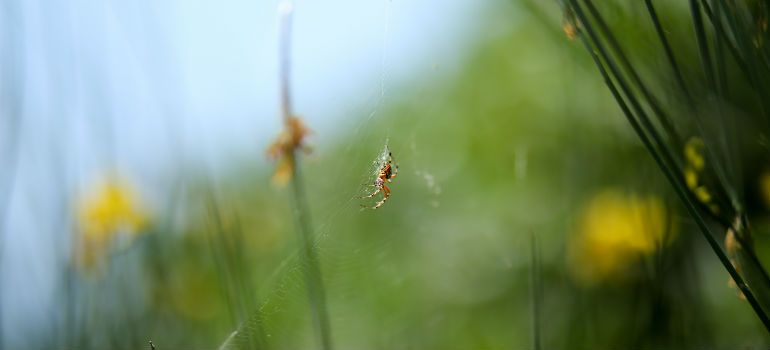
Spiders are not a pleasant sight for everyone, but have you ever wondered what do spiders eat? Something not many people appreciate is that these little creatures act as nature’s pest control, feeding on common household bugs like flies, mosquitoes, and cockroaches.
In recent years, more people have started leaving house spiders to live rent-free in their homes and gardens, recognising their role in keeping unwanted pests in check.
People realised that spiders aren’t dangerous to humans, pets, or produce but quite the opposite in fact. Spiders can be natural pest control against terrorising insects.
Table of Contents
What Do Spiders Eat?
Though they seem quiet and discreet, spiders are skilled hunters when it comes to meals. Most follow an insect diet including flies, mosquitoes, ants, and moths. Larger species, such as tarantulas and huntsman spiders, can, however, pursue larger prey including small lizards and frogs.
Where a spider lives determines its food. While jumping spiders and wolf spiders aggressively chase and pounce on their prey instead of depending on webs, house spiders, for example, eat typical domestic pests like cockroaches, silverfish, and even dust mites.
How do spiders kill and eat their prey?
Though they hunt differently, spiders all immobilise their prey with venom. Web-building species spin sticky traps and wait for insects to become entangled. Once seized, the spider injects venom, paralysing the prey and dissecting its insides for simple consumption.
Hunting spiders, such as jumping spiders, use a more aggressive strategy. They ambush and attack their victims directly. Because they cannot chew, spiders rely on their digestive enzymes to break down their meals before consuming the nutrients, leaving only an empty exoskeleton in their wake.
How often do spiders eat?
Unlike humans, spiders don’t need to eat daily. Smaller species may snack every few days, while larger spiders, like tarantulas, can go weeks between meals. When food is scarce, spiders slow their metabolism to survive longer without eating.
Check also:
What Do House Spiders Eat?
the house spider diet includes any insect that flies or crawls, including ants, bees, mosquitoes, cockroaches, centipedes, aphids, flies and beetles. Most common house spiders in the UK are predators and will control the population of other insects inside your home.
Do spiders eat woodlice?
Woodlice tend to inhabit moist places both in your home garden. While not all spider species would eat these creatures, there are one species that feeds primarily on woodlice. It’s the Woodlouse spider.
Do spiders eat fleas?
Yes, whether the fleas are in your garden or inside your house, spiders will happily feed on them. Keep in mind that if you have a heavy flea infestation, spiders alone cannot take care of the problem.
Do spiders eat silverfish?
Yes, some species are known predators of silverfish. Most commonly, the spitting spider includes them in their diet. In case a silverfish infestation is brewing somewhere in your home (most often in basements or attics), the presence of spiders can help prevent it in the beginning. But as with any other heavy infestation, spiders won’t be able to handle it on their own.
Do spiders eat bed bugs?
If the spiders are big enough, they could eat bed bugs. Since bed bugs mostly stay near the bed but spiders do not it’s not that often that they cross paths. However, spiders will not eat enough of them to control their population. So if you have a bed bug infestation, you must contact bed bug control specialists.
Check also: Spider Bite vs Bed Bug Bite
Do spiders eat moths?
Indeed, house spiders do consume moths. Drawn to light, moths often find themselves directly in the web of a spider. Web-building spiders are well-suited to catching these tiny pests. Once a moth gets caught, the spider will fast immobilise it and start feeding.
Do spiders eat ants?
House spiders will eat ants as well. Although ants are not usually the simplest food to catch, when they stray into a web spiders will nevertheless take pleasure in eating them. Some active hunters – such as wolf spiders or jumping spiders – will even hunt ants to capture and eat. Although house spiders can assist cut the ant count in your home, they often are unable to curb a significant ant invasion.
Do spiders eat other spiders?
Some species can prey on their own kind if food is scarce. An example of a species turning to cannibalism is the Pholcus phalangioides, aka Daddy long-legs. No spider species actively seek other individuals to eat them as part of their diet.
Furthermore, there is reproductive cannibalism in the spider kingdom. It is common in the insect world, and often it’s the females which kill and eat the males after copulation. If there are cases in which males eat females, they are extremely rare.
Check also:
So, Why Do Spiders Invade My Home?
It is a common misconception that spider invasions increase in Autumn because they are looking for shelter for the winter. However, this isn’t conclusively proven.
They usually make their home in people’s houses to hide from the harsh elements outside. Once they have found a warm cosy place, they would wait for any other unwelcome insect, like a mosquito, for example, to fly by their web.
If there is no food around, they will find another place to live. Still, it’s not pleasant to have them at home, and if their population goes out of hand, you might need to give a call to a spider control professional.
Are you dealing with a pest infestation?
You don't have to be alone in the battle against pests. Hire a professional pest expert!
Call usHow Effective are Spiders in Pest Control?
In a word – very effective. The world’s estimated 25 million metric tons of spiders eat between 300 and 800 million metric tons of food per year. This means that on average, a single spider eats about 25 metric tons of food each year. This food mostly consists of insects, and small vertebrates, and a small part of it is also plant matter.
This means that leaving a couple of house webbing spiders means they will take care of any other type of insect entering your home. The same goes for leaving spiders in your garden. If you see a spide’s nest, do not be quick to destroy it. Leave them be, and they will protect your flowers and produce from destructive pests, such as aphids.
How to Make Spiders Useful in My Garden?
After learning this mind-numbingly large number of food they eat, the first thing one would think about is how to put these hungry little creatures to good use. The best idea you can have is to unleash them in your garden.
There are already stores where you can buy spiders and praying mantis (the other insect predator) to use as a biological weapon against all those pests who eat your garden plants. The good thing about spiders is that only a few species are known to eat plant matter, so as long as you don’t get any of those, you’ll be fine.
Now, you won’t need to spray your garden with any harmful insecticide.
An elegant idea like this is unfortunately not as widely spread as it should be since people are squeamish when it comes to having to deal with insects of any kind. This huge number we mentioned earlier is measured mostly in forests and mountains where the spiders play an important role in keeping the insect populations under control.
But, utilizing them for personal use can only work for the better.
Check also:
Is There a Con of Using Spiders in the Garden?
One of the problems you may encounter is that spiders are relatively likely also to attack other spiders since they can get aggressively territorial. This might reduce the beneficial insects in your garden. However, so far, it has never been regarded as the kind of drop that would increase the population of harmful insects.
When you introduce a predator to an environment with lots of food, it’s normal that they grow in population, and eventually, they will have to compete. It’s all part of evolution.
Another con is that if their population grows out of control, they may also get inside your house and you may need professional pest treatment.
Takeaways
Spiders can be a very effective form of insect control if you have a flower or food garden. They would kill all unwanted pests while preserving your plants and even decorating them with beautiful shiny webs.
Do you agree with us? What other tips and tricks do you know about biological pest control? We’d love it if you shared them below in the comments.
Picture source: prdyapim / shutterstock.com
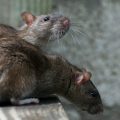
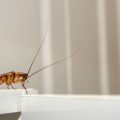


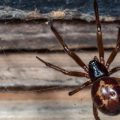
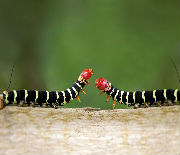
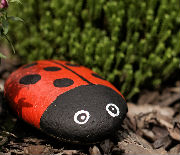
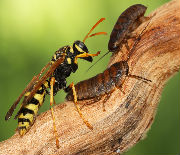
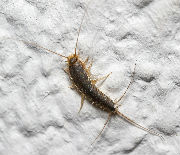
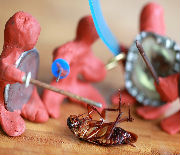
On average, a single spider eats about 25 metric tons of food each year… seriously? That’s a lol! Nice post, thanks for sharing!
Surely that’s every ton of spiders eat 25 tons of food. If we say a spider weighs 5g isn’t that each spider eats 125g of food?
Extremely interesting facts enjoyed reading this piece very much.
I totally agree with keeping spiders alive in my house, as they keep the number of flies down to a minimum and save me chasing flies down with some sort of swatter.
But my question is, during the winter months when there is a lack of flying insects, is there any other food source that I can keep them health with.
Yes I love spiders, I think they are one of the most impressive species on our planet.
Sounds weird but I would like to keep my spiders alive in my house with some other type of food but I do not know if that’s possible without buying flies, if that is even possible.